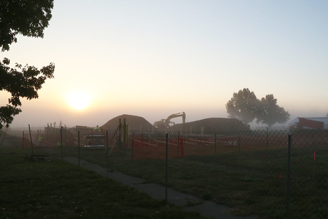
CFAES’s Marne Titchenell talks about white-nose syndrome, a new disease that is spreading and killing bats in Ohio and North America, from 7-9 p.m. tonight, Oct. 24, at the First Amendment Public House, 150 W. Liberty St., in Wooster. It’s part of the Science Café series sponsored by the College of Wooster and CFAES’s research arm, OARDC. Free admission. Bats help control crop pests by eating them, which helps keep food production sustainable. (Photo by Nick Hristov via Wikimedia Commons.)
 What can you do with a dead cow or chicken? Well, to paraphrase Monty Python, you can burn it, bury it or render it. Or — to save money while protecting the environment and improving the soil — you can compost it.
What can you do with a dead cow or chicken? Well, to paraphrase Monty Python, you can burn it, bury it or render it. Or — to save money while protecting the environment and improving the soil — you can compost it.  Hunter Anderson, research ecologist with the U.S. Air Force, presents
Hunter Anderson, research ecologist with the U.S. Air Force, presents  CFAES’s research arm, OARDC, will host
CFAES’s research arm, OARDC, will host  Construction continues Oct. 17 on the new
Construction continues Oct. 17 on the new  Stink bugs are casting a pall this fall
Stink bugs are casting a pall this fall  Virginia Tech’s
Virginia Tech’s ![darwin_04[1]](wp-content/uploads/2013/10/darwin_041.jpg) The
The  Farmers who are negotiating easements across their land for shale oil and gas pipelines may want to consider including a clause about
Farmers who are negotiating easements across their land for shale oil and gas pipelines may want to consider including a clause about